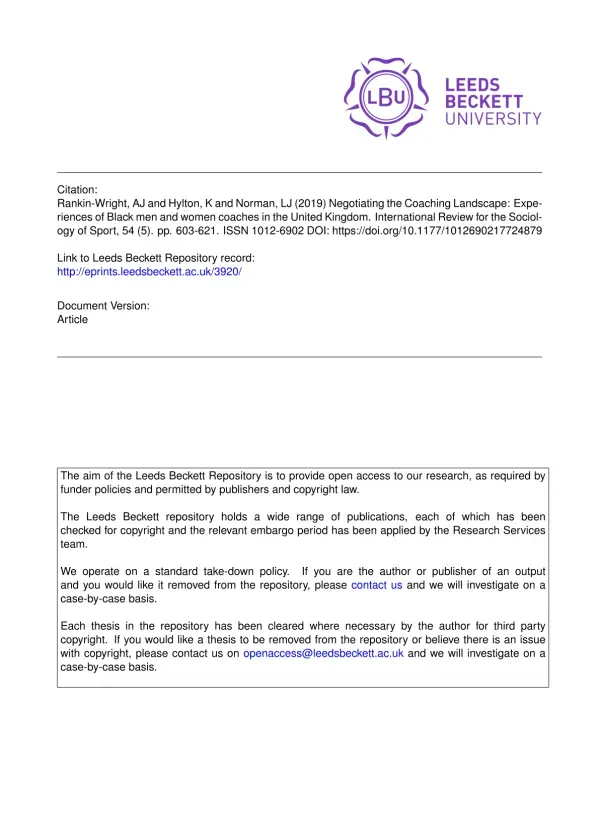
Exploring Racial and Gender Inequalities in Sport Coaching: Experiences of Black Coaches in the UK
Document information
| Author | A.J. Rankin-Wright |
| School | Leeds Beckett University |
| Year of publication | 2019 |
| Place | UK |
| Document type | article |
| Language | English |
| Number of pages | 38 |
| Format | |
| Size | 542.49 KB |
- Coaching
- Racial Equality
- Gender Disparities
Summary
I. Introduction
The article 'Exploring Racial and Gender Inequalities in Sport Coaching: Experiences of Black Coaches in the UK' critically examines the racialised and gendered processes that contribute to disparities in sport coaching. It highlights the underrepresentation of Black coaches in leadership roles within the UK sporting context. The authors, Rankin-Wright, Hylton, and Norman, utilize a Critical Race Theory approach and a Black feminist lens to analyze the lived experiences of Black men and women coaches. The findings are based on qualitative interviews with coaches from two national governing bodies, revealing the complex dynamics of race, ethnicity, and gender in sport coaching. The article emphasizes the need for stakeholders to recognize the intersectional experiences that both facilitate and constrain the progression of Black coaches. It challenges the notion that sport is a meritocratic space, arguing instead that it is rife with systemic inequalities.
II. Methodology
The research employs qualitative methodologies to gather in-depth insights into the experiences of Black coaches. The authors conducted interviews with participants from two national governing bodies, focusing on their narratives to uncover the systemic discrimination they face. This approach allows for a nuanced understanding of how privilege and blind spots manifest in coaching environments. The qualitative data collected provides a rich context for analyzing the intersection of race, gender, and ethnicity in sport. The authors argue that traditional research methods often overlook the voices of marginalized groups, making this study significant in centering Black coaches' experiences. By employing a Black feminist lens, the research highlights the unique challenges faced by Black women in coaching, thus contributing to a broader understanding of intersectionality in sport.
III. Key Themes
The article identifies three primary themes that emerge from the coaches' narratives: negotiating identities, privilege and blind spots, and systemic discrimination. The theme of negotiating identities explores how Black coaches navigate their racial and gender identities within predominantly white coaching environments. The authors note that many coaches feel pressured to conform to dominant cultural norms, which can lead to a sense of isolation. The theme of privilege and blind spots examines how systemic advantages are often invisible to those who benefit from them, perpetuating inequalities in coaching. Finally, the theme of systemic discrimination highlights the barriers that Black coaches face in their professional development, including limited access to resources and support. These themes underscore the need for a critical examination of the structures that uphold racial and gender disparities in sport coaching.
IV. Implications and Applications
The findings of this research have significant implications for policy and practice in sport coaching. By illuminating the intersectional challenges faced by Black coaches, the article calls for a reevaluation of existing coaching frameworks and policies. Stakeholders in sport organizations are urged to implement strategies that promote diversity and inclusion, ensuring that Black coaches have equitable opportunities for advancement. The research also advocates for ongoing training and education on racial and gender issues within coaching contexts. By addressing these disparities, sport organizations can foster a more inclusive environment that values diverse perspectives. The insights gained from this study contribute to the broader discourse on racial and gender equality in sport, emphasizing the importance of representation and equity in coaching.
Document reference
- Negotiating the Coaching Landscape: Experiences of Black men and women coaches in the United Kingdom (Rankin-Wright, AJ and Hylton, K and Norman, LJ)
